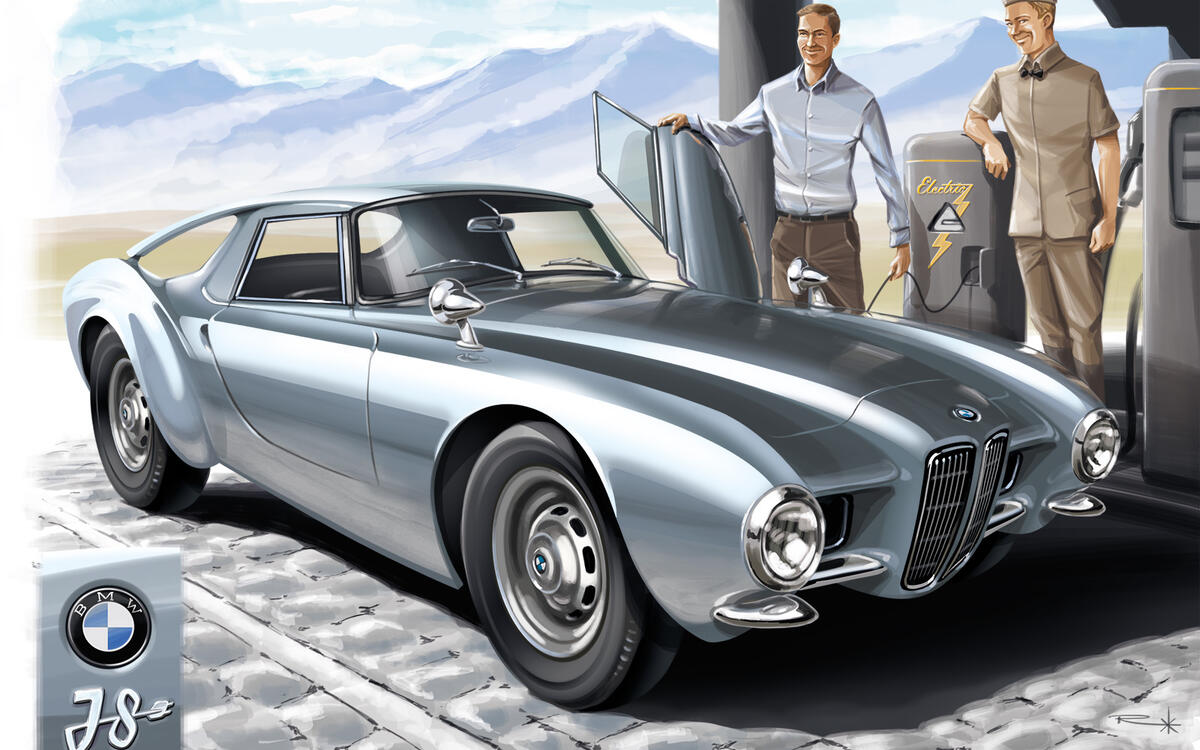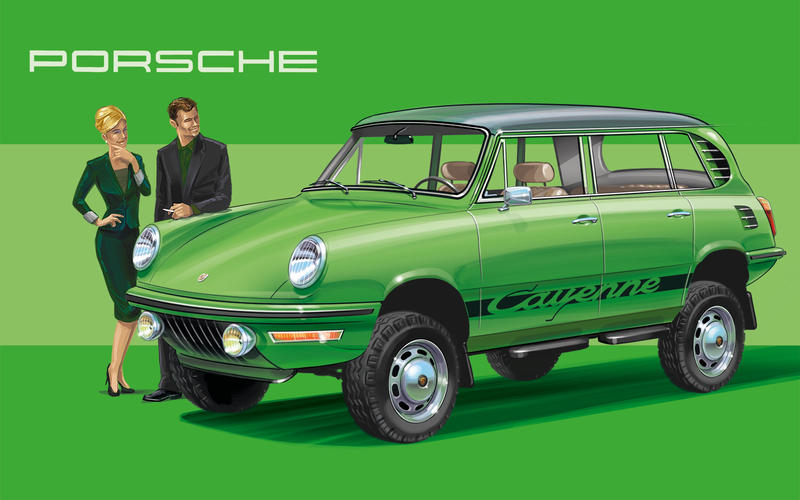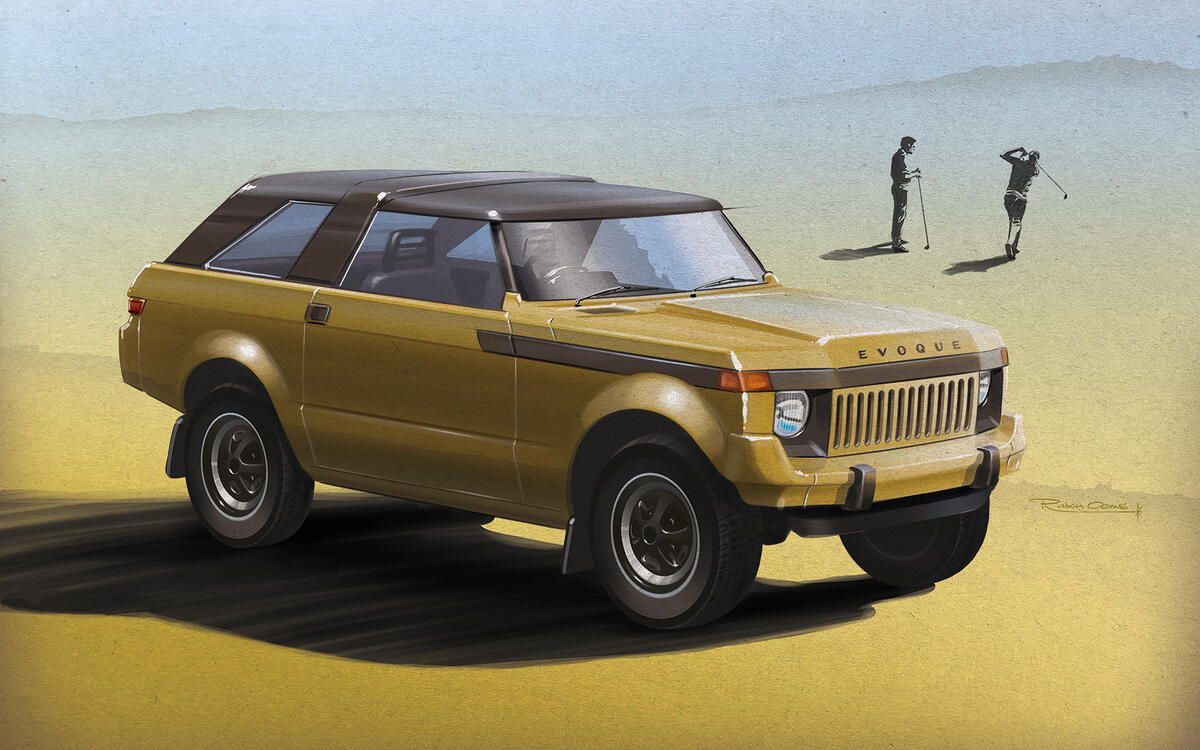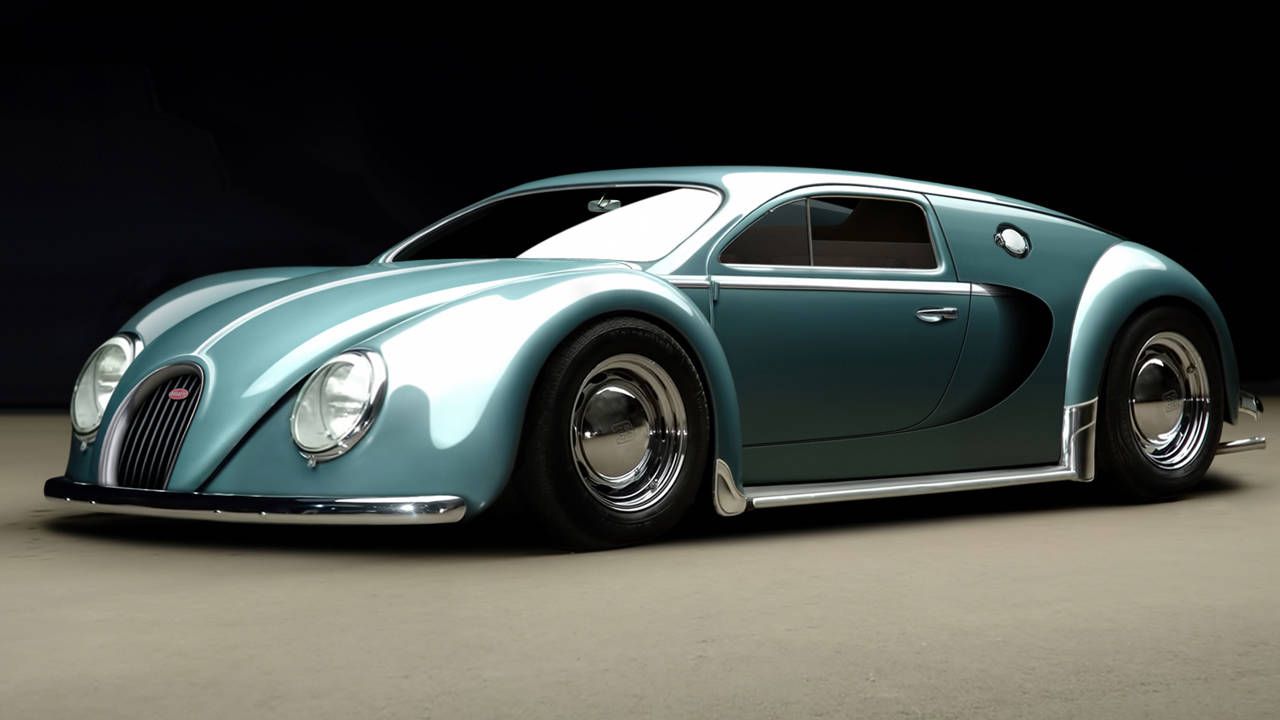Thanks to Autocar magazine, now we know what the 1981 Audi R8 looks like. Their website seems to have some formatting problems, so here you go.

1955 MERCEDES 119 – 'A-CLASS'
In the mid-fifties, Germany was still recovering from the ravages of war and Germans mostly rode bicycles or drove BMW Isettas bubblecars. Meanwhile the country's most important carmaker, Mercedes, built pontoon sedans and SL sports cars for the well-heeled and famous. Nevertheless four decades later they made their own people’s (compact) car which infamously fell over in the elk test, the A-Class.
Would things have been better if Mercedes had tried to do something in the colorful world of the 50s? Here’s the 119, positioned between VW Beetle and Mercedes 180; with its engine in the front and the nose of the Transporter 319.

1955 PEUGEOT 103 – 'PEUGEOT 1007'
Peugeot now as ever is one of the big three French brands: always predictable, conservative; the French Mercedes. In 1955, the company had the brand new 403 with pontoon body and round headlights and the old-fashioned 203 with moulded fenders in the catalogue. Both dated and not much choice for the consumer.
Even then, Parisian streets were cramped, and who knows, a need for a high-quality, small car for the bustling Parisian middle and upper classes could have developed nicely. No Spartan poor people’s car, that's what others provided, but something solid. Maybe the face of the 403 and elements of the 203 down the side, only small and with sliding doors to park in tight spaces, in front of the restaurant or tobacconist’s.
Okay, the panoramic windshield would have been as expensive to manufacture then as a whole small car, but what an opportunity for the well-dressed driver to show off to passers-by.


Slide 1 of 12

1960 ALFA ROMEO GINA – 'ALFA ROMEO MiTO'
Technically, things would have been difficult at first. Alfa Romeo in the ‘60s was a manufacturer of sporty sedans and sports cars with front-engine and rear-wheel drive. Alfa’s engineers would never have squeezed all of that into a compact four-seater the size of a Fiat 500. On the other hand in 1959, Alec Issigonis designed the four-seater Mini on a tiny footprint, which was fun and agile to drive. Suitable technology was therefore on the shelf, only the wrong way round.
But what if instead of Innocenti, the Alfa people had taken this technical base from England, spiced up the engine with one of their famous double cam cylinder heads and applied the Giulietta’s pretty face and the flanks of the Giulia? Include a short Italian woman's name - Gina perhaps - and the car would have taken away half the sales of the 500.
Instead, things turned out differently: Alfa sold too few cars and was bought by Fiat in 1986. The Fiat people finally put the small car idea into production, unfortunately by dropping Alfa elements onto the platform of their Grande Punto to make the MiTO.

Slide 1 of 12

1956 BMW E07 – 'BMW i8'
In the early days of the car, the engine issue was at least as open as it is today: gasoline and electric motors were most popular along with wood, steam, diesel and gas power. Had the electric motor prevailed at that time, many things would have looked different: BMW's sports car 507, introduced in 1956, would still not have worn a modern "i" like "intelligent" in its name, but E07 would have been an option. And the gas station attendant would not have been carrying round a greasy rag.
No bending into the engine compartment to check the oil level of the 3200cc aluminum V8, but perhaps a splash of distilled water to top up the level of the batteries before plugging a cable from the charging tower into the car’s terminal. Either way, BMW should have counteracted the price-competing iconic, over-inflated Mercedes 300 SL door with a coupé with scissor doors and buttresses in the style of the modernist i8.

Slide 1 of 12

1962 CITROËNC IC - 'CITROEN CACTUS'
More courage was needed at the start of the 60s, just noone at Citroën needed convincing. The good old 2CV and DS already existed, and in 1961 the French also embraced the Ami 6. The small saloon was based on the 2CV but slightly larger, more refined and less rustic.
Where there is no lack of desire for distinctions and a sense of practical solutions the following idea could have caused a sensation: a small sedan with an elegant line on the outside with upholstery in the style of the psychedelic fabric patterns of the new era - what a way to stand out in Paris traffic?
Project name: "Chic". A truly avant-garde variant would have simplified DS technology that was too expensive for the Ami 6. Alternatively the technically simple but also chic and practical Chic 6: put the body over the technology of the Ami 6 and make it the big city variant of the provincial car.

Slide 1 of 12

1972 PORSCHE 999 – ‘PORSCHE CAYENNE’
Porsche recently presented the third generation of its high-roof, high-performance sports car Cayenne. You can barely push a hand between the low-profile tire and the wheel arch, just like the 911. But things were different back in 1972 - what would a Porsche SUV have to look like if made then? Let's call it the 999.
For a start make it all-terrain, with large suspension travel and chunky tires. Naturally the front should look like 911, the rest may as well be Volkswagen. No question about an air-cooled boxer engine in the back, with vents in the rear pillars for the oil coolers. And the name Cayenne? In the case of the off-road vehicle and similar to Carrera, it would have been used for the specially upgraded variant, here sporting vinyl roof, front driving lights and side sill protection with footboard function.


Slide 1 of 12

1936 TESLA MODEL C – ‘TESLA MODEL S’
Electric cars were all the rage in New York more than 100 years before Elon Musk’s first Tesla Roadster first turned a wheel, with more electric cars on the city’s streets in 1900 than those powered by gasoline. Henry Ford’s wife Clara didn’t want a Model T so he bought her a 1914 Detroit Electric, a car capable of 80 miles at 20mph on a single charge. What if investment into gas-powered cars had gone instead into battery power, would our streets be quieter and the air less polluted?
And where could electric innovator Nikola Tesla have taken us with investment from a billionaire financier with a dream to build his own futuristic car with cutting edge technology? By the mid-1930s the nationwide charging infrastructure would be struggling to compete with the alternative fuel petrol engine but in larger towns and cities quiet and clean electric would still be king. Battery development and limited speeds in cities their suburbs would ensure significantly larger range and quicker charging and no self-respecting film star or tycoon would be seen in anything less than the sleek and low-slung Tesla Model C. It was the company’s swan song though, just three years late the world’s car companies would be gearing up for war and gasoline power would prevail for the next 60 years. But this is quite a 'what if', to say the least.


Slide 1 of 12

1979 RANGE ROVER EVOQUE – ‘RANGE ROVER EVOQUE’
What fuel crisis? In the mid-1970s Chrysler’s French outpost Simca teamed up with Matra to build the Rancho, Europe’s first real SUV and a cheaper more road-orientated version of the Range Rover, which itself was designed as a utilitarian vehicle with a vinyl interior you could hose clean. The Rancho looked big and tough but in reality was front-wheel-drive only and only sold in modest numbers, though it did spawn the Renault Espace, Europe’s first minivan. Range Rover continued to carry the SUV torch for years to come, but through the 1980s and into the 1990s the supermini hatch and three-box saloon ruled supreme.
Range Rover, Land Rover and Jaguar spent the 1970s under the mess that was British Leyland. What if they instead of Matra had combined the rugged look of a Range Rover with a hatchback platform, just with the luxury of a Jaguar to create a whole new niche car? And, more importantly, how sleek and cool would that 1970s Evoque coupé have been without all the baggage of modern safety regulations?


Slide 1 of 12

1980 AUDI R8 – ‘AUDI R8’
Audi always seemed to flirt with the idea of producing a Grand Tourer sports car, contributing parts to the Porsche 924 and taking six years from first winning at Le Mans in 2000 to the R8 finally going on sale. During the 1970s Porsche took all the sports car glory with its 911, 928 and 924 models while Audi concentrated on safety with its four-wheel-drive system, first introduced on 1980's Audi Quattro. BMW’s futuristic M1 – a homologation special built in Italy - was launched just two years earlier. Audi chose to go rallying with the Quattro but what if Porsche hadn’t been dominating the prototype and GT classes at Le Mans and Audi had looked at a sleek mid-engine sports car like the M1 but with its quattro drivetrain?
OK, the four wheel drive system would only really benefit a car on wet or loose surface coming out of tight corners and the extra weight would bog down the car elsewhere but we’re talking here about what could have been. Ironically it was Lamborghini who were supposed to make the M1 – a company that now shares parts with sister company Audi.

Slide 1 of 12

1977 TOYOTA PRIUS – ‘TOYOTA PRIUS’
The 1970s fuel crisis shrank cars almost overnight and renewed interest in electric cars. GM built an Electrovette concept car, based on the Chevette, with an electric motor giving a range of 50 miles at 30mph. Toyota’s Prius would have been fairly limited, weighed down by lead batteries and with limited range but as a short-range four-seat taxi or city car?

Slide 1 of 12

1965 DODGE VIPER – 'DODGE VIPER'
In the mid ‘60s Dodge was in the market for new design direction following the controversial departure of Chrysler's prolific design chief Virgil Exner. And like the other Detroit players at the time, it was also looking beyond the tailfin.
What better way to welcome in a new era than launching a low-slung, huge engined, fire-breathing muscle car, breathing life into the Dodge brand at the same time? Chrysler would indeed do this, but not until 1991 – but this is how we think it might have looked back in the '60s.
Okay, done. Is it wrong that I want that Prius and really want that Audi R8?

kb58
SuperDork
7/27/18 4:38 p.m.
I get a kick out of the first picture at the top of this thread. Either it's demonstrating the driver's bad-ass drifting skills, or the car's terrible understeer. Given the artist's "speed lines" behind the rear wheels, indicating the car flying to the left, it seems that it's the latter, lol.
Maybe he's being a responsible citizen and just exiting his driveway slowly. But I had the same problem.

Kreb
UberDork
7/27/18 4:55 p.m.
So much cross-polination. The tesla's reminiscent of a Tucker, and the Cayenne's like a jacked up Citroen.
The Audi looks a LOT like a Lancia Monte Carlo
From my friend Ottawa, the 1954 Bugatti Veyron.


STM317
SuperDork
7/27/18 6:33 p.m.
The Audi looks like a modern Lamborghini monocoque with a DeLorean nose grafted on.

codrus
UltraDork
7/27/18 6:57 p.m.

We already know what a 1962 Miata would look like. :)
Wow, that’s some damn fine art craft going on. That’s real talent!
Keith Tanner said:
Okay, done. Is it wrong that I want that Prius and really want that Audi R8?
the R8 looks a LOT like the Lancia Scorpion/Montecarlo.
The prius looks very convincing.
I think the old Prius is less ugly than the actual one :)
Pretty neat drawings though.
I too want the Audi. If I can't have it though I'd take the Alfa.
mad_machine said:
Keith Tanner said:
Okay, done. Is it wrong that I want that Prius and really want that Audi R8?
the R8 looks a LOT like the Lancia Scorpion/Montecarlo.
Crossed with a Jalpa. Neither of which is a bad thing.













































